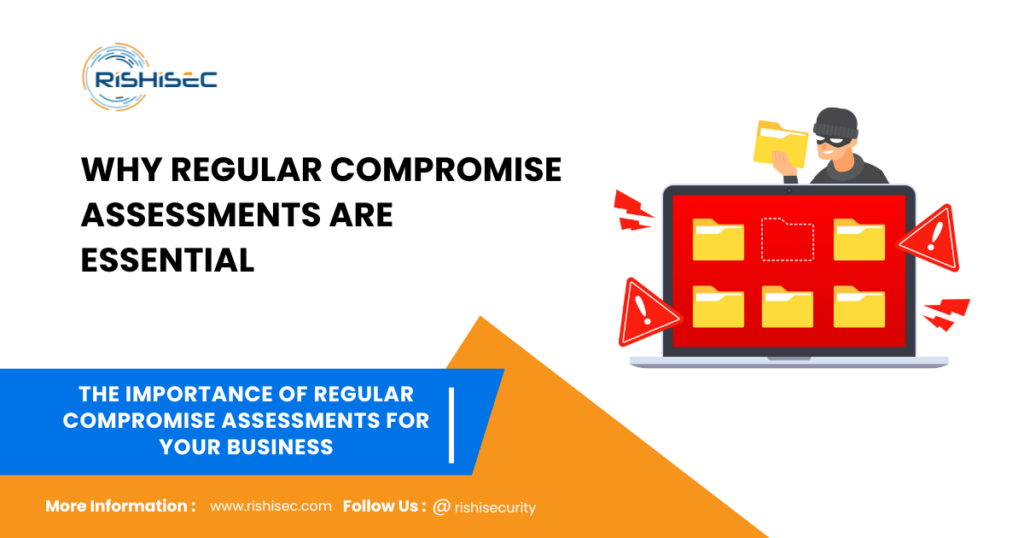Contents
- 1 Why Regular Compromise Assessments Matter for Your Business
- 2 Why Regular Compromise Assessments Are Essential
- 3 The Rise of Advanced Persistent Threats
- 4 Key Benefits of Regular Compromise Assessments
- 5 How to Perform a Compromise Assessment
- 6 The Role of Compromise Assessments in a Broader Cybersecurity Strategy
- 7 Conclusion: Making Compromise Assessments a Priority
- 8 CTA
Why Regular Compromise Assessments Matter for Your Business
The Importance of Regular Compromise Assessments for Your Business cannot be overstated. In today’s digital landscape, cybersecurity is no longer a luxury—it’s a necessity. With cyberattacks growing in frequency and sophistication, businesses can no longer afford to be passive in their approach to security. One of the most proactive measures you can take to protect your business is performing regular compromise assessments. These assessments not only help identify vulnerabilities but also ensure your company can respond quickly to potential breaches. For businesses looking to safeguard their digital assets, compromise assessments are an indispensable component of a robust cybersecurity strategy, providing a continuous pulse on your security posture and enabling swift, informed responses to emerging threats.
Why Regular Compromise Assessments Are Essential

As the digital threat landscape continues to evolve, cybercriminals are constantly finding new ways to infiltrate networks and steal data. Every business, regardless of size or industry, faces the risk of a cyberattack. Regular compromise assessments give organizations the ability to detect breaches early and prevent further damage, saving both time and money.
Consider the case of XYZ Corporation, which suffered a data breach that went unnoticed for months. Had they conducted regular compromise assessments, they could have detected the breach earlier, saving millions in recovery costs and mitigating damage to their reputation. By routinely assessing your network, you can detect suspicious activity early and act before it’s too late.
The Rise of Advanced Persistent Threats
One major threat businesses face today is Advanced Persistent Threats (APTs). Unlike traditional cyberattacks, APTs are long-term campaigns where attackers remain undetected inside a network for extended periods. These threats can lead to the exfiltration of valuable data, including trade secrets, customer information, and proprietary technology. Regular compromise assessments are crucial in detecting APTs before they can cause significant harm.
Key Benefits of Regular Compromise Assessments

1. Proactive Threat Detection
A regular compromise assessment is your first line of defense against cyberattacks. These assessments help identify suspicious activity in its early stages, giving your security team the opportunity to respond before the damage becomes catastrophic. Instead of waiting for a breach to be reported, you can detect and isolate threats proactively, ensuring your business remains secure.
2. Cost Efficiency
The financial repercussions of a data breach can be staggering. According to a 2023 Ponemon Institute study, the average cost of a data breach reached an all-time high of $4.45 million. By conducting regular compromise assessments, you can significantly reduce the likelihood of a breach, preventing the costly fallout that comes with incident response, legal fees, and brand damage.
3. Industry Compliance
Many industries, such as healthcare, finance, and retail, are subject to strict data privacy and cybersecurity regulations. Laws like GDPR, HIPAA, and PCI DSS require businesses to maintain robust security protocols, and failure to comply can result in severe fines. Regular compromise assessments help you stay compliant by identifying potential vulnerabilities before they lead to non-compliance.
4. Maintaining Customer Trust
In today’s interconnected world, data breaches don’t just affect the company—they impact customers as well. One major breach can erode customer trust, leading to churn and a damaged brand reputation. Regular compromise assessments demonstrate a company’s commitment to protecting customer data, helping maintain a strong brand image and trust among clients.
How to Perform a Compromise Assessment
Compromise assessments follow a structured process designed to uncover hidden threats. Here’s a step-by-step guide:
Step 1: Data Collection
The first step is gathering data from all corners of your IT environment, including network logs, endpoint data, and cloud infrastructure. Comprehensive data collection ensures that no part of the system goes unchecked, giving you the best chance of detecting hidden threats.
Step 2: Data Analysis
Once the data is collected, sophisticated tools are used to scan for Indicators of Compromise (IoCs). These may include unusual traffic patterns, unauthorized login attempts, or changes in file integrity. Security analysts will cross-reference these anomalies with known threat intelligence databases to determine if they’re signs of a compromise.
Step 3: Incident Response
When a threat is identified, immediate action is needed. Isolate the affected systems, investigate the source of the breach, and begin mitigating the damage. This swift action can prevent further spread and contain the threat, ensuring minimal disruption to your business operations.
Step 4: Remediation and Prevention
After responding to an incident, it’s essential to address the root cause. Patch the vulnerabilities that were exploited, update your security protocols, and reinforce weak areas of your infrastructure to prevent future attacks. Additionally, review your security policies and ensure all employees are trained in best cybersecurity practices.
The Role of Compromise Assessments in a Broader Cybersecurity Strategy

Compromise assessments should not be viewed as standalone efforts; rather, they are a crucial part of a broader, layered cybersecurity strategy. By integrating them with other security measures—such as endpoint detection, vulnerability management, and continuous monitoring—you create a comprehensive defense system that leaves little room for cybercriminals to operate.
Regular assessments also enhance your incident response capabilities. When a breach is detected, having a clear, well-documented response plan in place ensures your team can act swiftly and decisively, reducing the impact on your business.
Conclusion: Making Compromise Assessments a Priority
The Importance of Regular Compromise Assessments for Your Business cannot be overlooked. With the increasing frequency and sophistication of cyberattacks, regular compromise assessments are not optional—they are essential. These assessments empower businesses to stay ahead of threats, ensure compliance, and safeguard their reputation. In a world where one data breach can change everything, staying proactive through regular assessments can mean the difference between surviving a cyberattack and falling victim to it. By routinely evaluating your organization’s security posture, you not only mitigate risks but also enhance resilience, enabling your business to maintain trust and continuity even in the face of evolving cyber threats.
CTA
Protect your business today by investing in regular compromise assessments. At SentryCA, we offer a free trial of our comprehensive compromise assessment solution, designed to help businesses like yours identify vulnerabilities before they become major issues. With SentryCA, you get real-time insights, fast threat detection, and seamless integration with your existing infrastructure. Don’t wait for the next cyberattack—get ahead of it. Start your free trial today and take the first step toward securing your business.
Learn right now about How to Integrate Compromise Assessments into Your Cyber security Strategy


